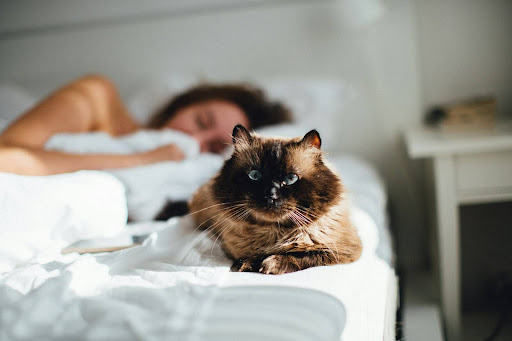Imagine this: you wake up, stretch, and inhale deeply, only to be greeted by the unmistakable scent of cat pee. Your cozy bed has been transformed into a feline restroom, and your cat? Well, they’re just sitting there, unprepared, staring at you as if to say, “What? I’ve claimed this territory.”
Fear not, weary cat owner! You’re not alone in this battle. Let’s unravel the enigma behind your cat’s rebellious behavior. Why, oh why, would they choose your bed over the perfectly good litter box? Spoiler alert: it’s not because they’re mad at you (although sometimes it feels that way).
Why Does My Cat Pee On My Bed Out Of Nowhere
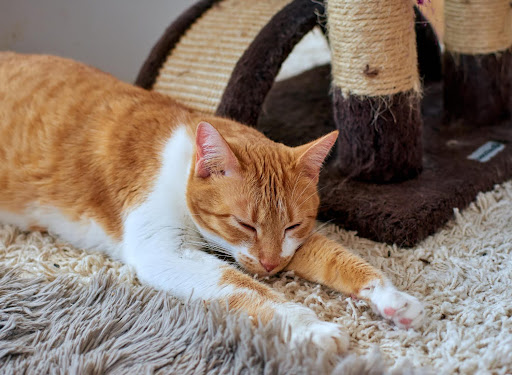
Waking up to a puddle on your bed is enough to make anyone raise an eyebrow (and hold their nose). But before you banish your feline friend to the couch, it’s crucial to understand why this unexpected behavior is happening.
Look For Medical Issues
Sometimes, inappropriate elimination can be a sign of underlying health issues like urinary tract infections, metabolic diseases (such as kidney disease, diabetes, or thyroid issues), bladder stones, or Feline Lower Urinary Tract Disease (FLUTD). A visit to the vet is crucial to rule out any medical concerns before diving deeper into behavioral solutions.
Stress or Anxiety Triggered
Cats are creatures of habit, and any changes in their environment – a new pet, a move, or even a new roommate – can trigger stress and anxiety. When feeling overwhelmed, they might make cats peed on the bed or pillow as a way to communicate their discomfort.
Can Be Behavioral Problems
While less common, sometimes cat peeing on bed can be due to behavioral problems like dominance marking or territorial disputes. This is more likely in multi-cat households or if your cat feels insecure about their position in the pecking order.
Watch For Litter Box Issues
Is your cat’s throne fit for royalty? A dirty, smelly, or poorly placed litter box can be a major turn-off for even the most dedicated feline bathroom user. Therefore, a dirty or inadequate litter box can also encourage your cat to seek out alternative places to relieve themselves, such as your bed.
Need Attention
Though not always the case, some cats peed on your bed sheet just to grab your attention, especially if they feel neglected or ignored. Sometimes, your cat does that just to blend their scent with yours or with another individual who shares the bed. They don’t do it because they’re angry or spiteful but rather want to establish a communal scent.
In that sense, you can even pee on your clothes as well. Similarly, if there’s a new person in the bed, your cat might feel insecure and seek reassurance of belonging.
How to Stop My Cat From Peeing on My Bed
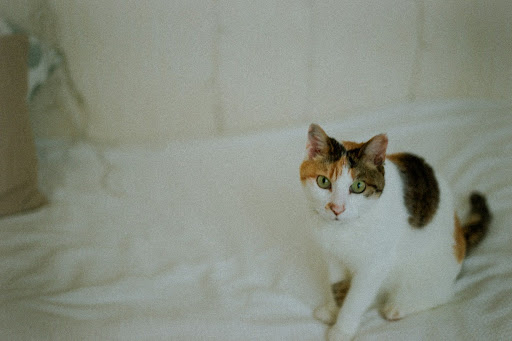
Cats can sometimes develop undesirable habits, and peeing on the bed is one of them. If you’re dealing with this issue, here are some steps you can take to address it:
1. Visit the vet
Before trying any behavioral solutions, a visit to the vet is crucial. Rule out any underlying medical conditions that might be causing your cat discomfort and contributing to their inappropriate elimination.
2. Address stress or anxiety
If your vet gives your cat a clean bill of health, then it’s time to address potential stress factors. Identify any recent changes in their environment and try to mitigate them. Provide ample hiding spots, vertical spaces for climbing, and engaging toys to keep them mentally stimulated.
3. Clean and deodorize the bed
Cats are sensitive to smells. Thoroughly clean the affected area using an enzyme-based cleaner to remove any lingering urine odor. Regular vacuuming and washing of bedding is also essential to eliminate any traces that might attract your cat back to the scene of the crime.
4. Place treat in No-Pee zone
Transform the “no-pee zone” into a positive space. Scatter treats or place their favorite food bowl near the bed to create a positive association. Cats are less likely to eliminate in areas where they eat.
5. Provide a comfortable and safe litter box
Ensure your cat’s litter box is a feline five-star resort. Choose a spacious box, keep it clean with daily scooping, and experiment with different litter types to find their preference. Location matters too – place the box in a quiet, easily accessible area away from high-traffic zones.
6. Use deterrents
Make the bed an unappealing place to urinate. While not a long-term solution, deterrents like double-sided tape, crinkly mats, or citrus scents (cats dislike the smell) can temporarily discourage your cat from approaching the bed. You can also use commercial cat deterrent sprays.
7. Consider behavioral therapy
If the problem persists, consider consulting a certified animal behaviorist. They can provide personalized guidance and strategies tailored to your cat’s specific needs and help you navigate the path towards a pee-free sleep haven.
Remember, patience and consistency are key when dealing with cat behavior issues. Be gentle with your furry friend and work together to find a solution that keeps both of you happy (and hopefully, purrfect cuddles!).
What Scent Deters Cat From Peeing
- Citrus: Cats are known to dislike the scent of citrus fruits like oranges, lemons, and grapefruits. Using citrus-scented sprays or placing citrus peels in areas where your cat tends to urinate can help deter them from the area.
- Vinegar: The strong smell of vinegar can be off-putting to cats. Mix equal parts of vinegar and water and spray it in areas where your cat has urinated to help neutralize odors and deter them from returning.
- Lavender: While humans find the scent of lavender calming, cats tend to dislike it. Using lavender-scented air fresheners or essential oils in areas where your cat tends to urinate may discourage them from marking those spots.
- Peppermint: The strong aroma of peppermint can also deter cats from urinating in certain areas. Sprinkle a few drops of peppermint oil on cotton balls and place them strategically around your home to help keep your cat away from unwanted areas.
- Eucalyptus: Like peppermint, eucalyptus has a potent scent that cats often find unpleasant. Using eucalyptus-scented products or essential oils in problem areas can help discourage your cat from urinating there.
- Rosemary: The strong, herbal scent of rosemary can act as a natural deterrent for cats. Consider using rosemary-scented sachets or essential oils in areas where your cat tends to urinate to help discourage them from marking those spots.
How to Use These Scents
To effectively deter cat peeing, create a DIY solution using these scents. First, thoroughly clean any remaining cat urine smells with an enzymatic cleaner or vinegar to prevent repeat incidents. Then, collect dried orange, lime, lemon, or any other citrus fruit peels. Place these peels near areas where your cat tends to pee, and enjoy a fresher-smelling home!
Tips For Proper Litter Box Management
A clean and inviting litter box is crucial to feline happiness and, consequently, a pee-free bed for you. Here are some key tips for creating a litter box haven your cat will love:
Good Location to Place Litter Box
Choosing the right location for your cat’s litter box is essential. Consider the following:
- Privacy: Cats prefer privacy when using the litter box. Place it in a quiet, low-traffic area where your cat won’t be disturbed.
- Accessibility: Ensure the litter box is easily accessible for your cat. Avoid placing it near noisy appliances or in areas with limited space.
- Away from Food and Water: Keep the litter box away from your cat’s food and water dishes. Cats prefer separate areas for eating and eliminating.
Suitable Litter Type & Litter Box
Selecting the right litter and litter box is crucial:
- Litter Type: Cats have preferences for different litter textures. Experiment with clumping, non-clumping, scented, and unscented litters to find what your cat likes best.
More for you → Top picked litter for your diabetic cats.
- Litter Box Size: Choose a litter box that accommodates your cat’s size comfortably. It should be large enough for your cat to turn around and dig without feeling cramped.
- Covered vs. Uncovered: Some cats prefer covered litter boxes for privacy, while others feel more comfortable with an open design. Observe your cat’s behavior to determine which type they prefer.Multi-Cat, Multi-Box
If you have multiple cats, follow these guidelines:
- One Box Per Cat Plus One: Ideally, provide one litter box per cat in your household. If you have two cats, have three litter boxes. This prevents territorial disputes and ensures each cat has options.
- Spread Them Out: Place the litter boxes in different areas of your home. Cats like to have choices, and spreading the boxes out prevents overcrowding.
Daily Scooping
Maintain a clean litter box by scooping waste daily:
- Remove Waste: Scoop out soiled litter and clumps daily. Cats appreciate a clean environment and are more likely to use a well-maintained litter box.
- Changing Litter Weekly: Completely change the litter once a week (or more frequently if needed). Nevertheless, adding fresh litter to replace what you’ve removed keeps the box inviting for your cat.
Make Your Cat To Pee Appropriately with Prevention Care
Preventing inappropriate urination from the start is ideal, and achieving this requires a multi-pronged approach that addresses your cat’s physical and emotional needs:
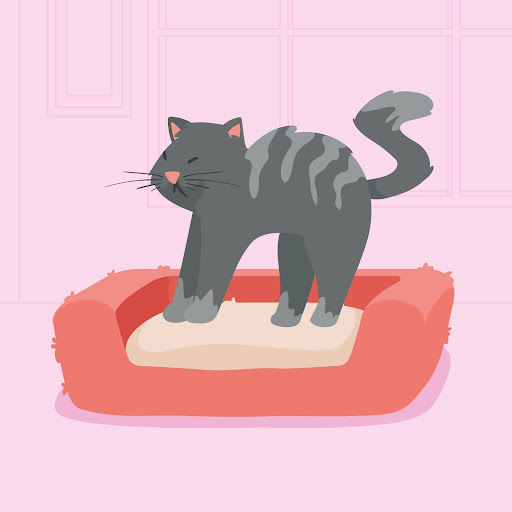
Routine cleaning
Maintain a clean and inviting litter box environment through routine scooping and regular litter changes. This eliminates unpleasant odors and encourages your cat to use their designated bathroom spot.
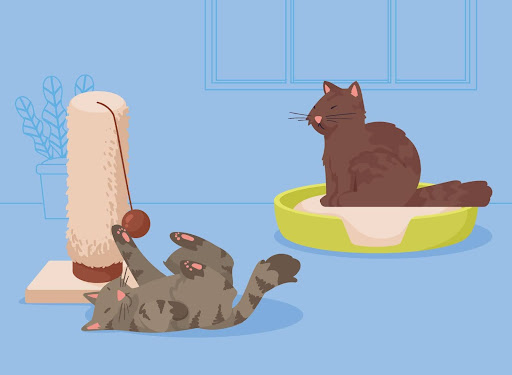
Environmental enrichment
Provide ample opportunities for your cat to express their natural behaviors. Offer scratching posts, climbing structures, and interactive toys to keep them mentally and physically stimulated. A bored or frustrated cat is more prone to engage in unwanted behaviors, including peeing here and there like bed, cloth, couch and so on.

Spaying or neutering
Spaying or neutering your cat can significantly reduce spraying and marking behaviors, especially in males. Consult your veterinarian to discuss the appropriate age and timing for this procedure.
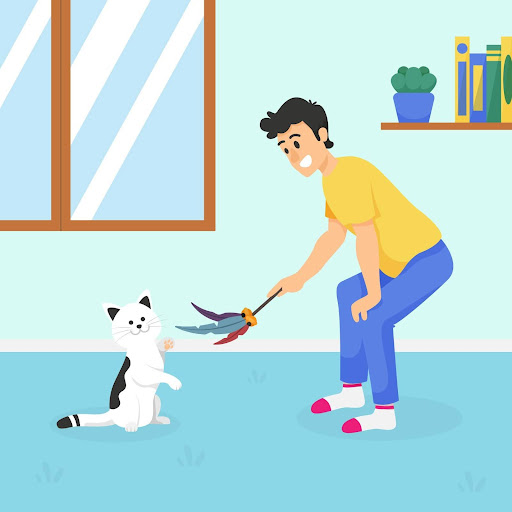
Quality time and attention
Shower your cat with love and attention through regular playtime, cuddles, and interactive activities. Building a strong bond and fulfilling their emotional needs can help prevent them from resorting to inappropriate elimination due to feelings of neglect or insecurity.
Closure
Discovering your cat using your bed as a personal restroom can be frustrating and confusing. But remember, this behavior is often a symptom of an underlying issue, not a deliberate act of defiance. By understanding the potential causes, implementing the strategies outlined above, and seeking professional help if needed, you can transform your sleep haven back into a peaceful sanctuary, free from unwelcome surprises.
Now, go create a comfortable and happy space for your feline friend! If you have any more questions, feel free to ask in the comments sections.

